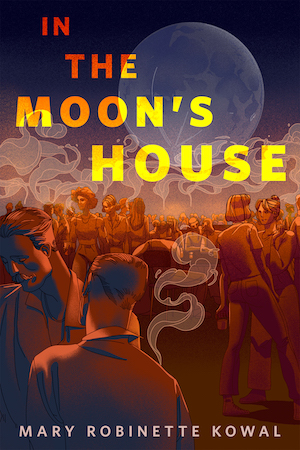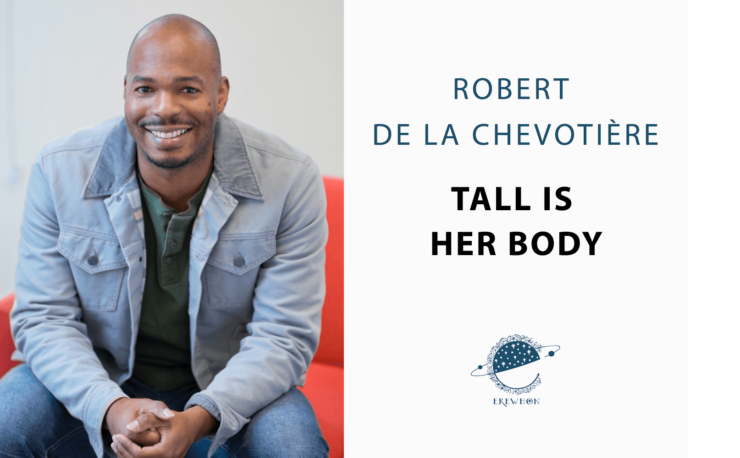Erewhon Books announces Tall Is Her Body, a sweeping, multicultural family story from author Robert de la Chevotière.
Before the gadèt-zafè came to warn his mother she would die, six-year-old Fidel knew only the everyday mystery of the Guadeloupe around him. The lush greenery, dusty roads, sugar cane growing and neighbors arguing, the push and pull of love and resentment between people who rely on each other: his world is small but full. Then a few moments of violence change his life forever.
Orphaned, Fidel returns to his mother’s native Dominica and whirls from one relative and reality to another, learning pieces of his own story. His heritage is one of layered secrets and sharp divisions—between the grandmothers who love him and the aunt who wants him dead, the Catholic orthodoxy of his school and the Obeah knowledge of his grandfather, the indigenous and the colonial. The violence he’s witnessed inhabits not only strangers, but himself. The spirits of the dead visit him with advice, threats, and explanations. And when he sees a path toward happiness in Canada, he must reconcile his intense, bittersweet love of his home with the possibility of leaving it.
Anyone who has travelled to Dominica (Waitukubuli) will say there is no place like it. Truly, there is not, and for me, In writing Tall Is Her Body, I felt it necessary to not only represent Dominica in all her complexity in the text, but to honour her, as a mother, sister, and daughter, in her ruggedness and her softness—a kind of ode to her femininity.
The fatherless male character is also important to me, as I grew up with a single mother and was raised by what I would call a “Triumph of Women.” This book is in many ways a tribute to them—my many mothers. Needless to say, when Sarah offered on this novel, it was not a difficult decision to make. Our visions completely aligned, and Sarah leads a fantastic team at Erewhon. I am excited to share this little corner of the world with readers everywhere, and to meaningfully contribute to the literature of the African diaspora.
—Robert de la Chevotière, author of Tall Is Her Body
When I read Tall Is Her Body for the first time, I found myself transported—not only to a time and place so vibrantly drawn that it felt just around the corner—but into a rich tapestry of painfully real characters, their difficult relationships and circumstances, and the complex choices they had to make. I was especially struck by Robert’s nuanced use of the supernatural and the way the narrative—despite being one young man’s bildungsroman—centered the women, with great compassion for all of their flawed, glorious humanity. I’m delighted to have the opportunity to work with Robert on this gem of a book, and for the Erewhon team to bring this fierce, urgent work into the world.
—Sarah Guan, Publisher of Erewhon Books
We lay in bed, but we hardly touched. I knew she was upset, but there was nothing I could do. She didn’t reveal what her parents said to her in the basement. I tried to spoon as we lay there, but she did not wish to be touched. She fell asleep and at some point, I did too, only to be awoken by rain against the window. It was soothing and prompted me to reflect on what happened at dinner.
I concluded that I should have just let the man talk; after all, it was his daughter. But then I thought, “I am a man too,” and that he had overreacted. The one thing I truly realized lying there was that my Dominican sunset was much more beautiful than the Morrisons’. And as the rain started to die down, Jeanine still sleeping soundly, I heard a murmur coming from the kitchen. I knew it was a spirit, and when I went there, I found Jeanine’s grandmother sitting at the kitchen table.
“This used to be my home,” she said. “It was passed down to me from my father. This is the only home that my husband Joseph and I ever lived in together, and the homestead of our children. Surely, I don’t need to introduce myself, do I?”
I shook my head.
“Tomorrow is guaranteed to no man. You of all people should know that.”
I knew she was there for a reason, and expected her to want something, but I was wrong.
“There were two men who wanted to marry me. Joseph and another fella, Jack. Jack was in the navy. He was big and strong, so manly—everything a woman would want . But he lacked dreams. I mean, he had ambition, but the moon was only ever a moon. It could never be a garden. But Joseph—my Joseph—planted gardens with me on the moon. He grew flowers in that garden, watered them, took care of them, named them, loved them, gifted them to the sun.
“One day a crate of poppies was delivered. They were from Jack, with a note, saying that he’d be home in three weeks and that he’d like to marry me, that the poppies were a token of his love.
“I didn’t marry Jack. Joseph intercepted the note and the poppies. He planted those flowers in the backyard along with the note, which he had put in a silver container, admitting they were from Jack. He said if I truly wanted to read the note, it was buried under the poppies that I loved so much, but that I’d have to dig them up. And every day he came by, and every day he watered them. And for the next two weeks, they shone with love, not from Jack, but from Joseph. In the third week he gave me a book of poems. He had written one after every visit to water Jack’s poppies.
“When Jack came home, he was so mad. He ripped up all the poppies, found the box and gave me the letter that was inside. I didn’t care for the letter. Obviously after all these years, the poppies are gone, but my book of poems is still here. So, when the time comes you must paint her that painting of her favourite things. Love her like you wish to love her, and when it’s time, call her by her name.
I felt the hair on my arm rise. Spirits usually need help, but this one didn’t—so unusual for me.
“And her spirit is doing fine,” said Jeanine’s grandmother. “She’s at peace.”
Unsure of what she meant, I looked towards the bedroom, where Jeanine was sleeping. I looked back at her grandmother. The spirit shook her head. “Your daughter.”
And with those words she walked away, into the next room, and vanished. I sat at the kitchen table, realizing that I would have to be bigger than what I want, and if I’m to be a giant, it would have to be under my banana bush.
Excerpted from Tall Is Her Body, copyright © 2024 by Robert de la Chevotière










